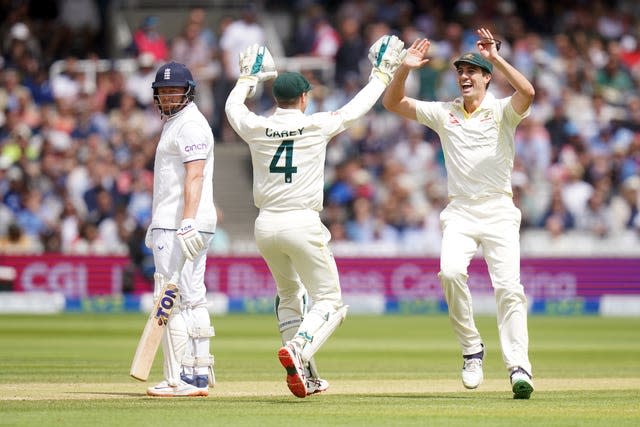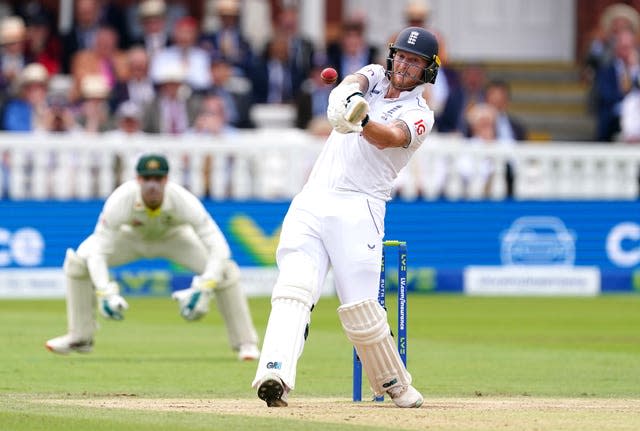Brendon McCullum: Lord’s incident could affect Australia and galvanise England
Brendon McCullum believes the furore over Jonny Bairstow’s dismissal at Lord’s could be the turning point for England’s Ashes campaign, and predicted Australia would come to regret their part in the controversy.
Alex Carey’s opportunistic stumping of his fellow wicketkeeper during a dramatic conclusion to the second Test sparked unprecedented fury from fans and members at the home of cricket and the row showed no signs of slowing down on Monday.
Ex-players and pundits from both countries weighed in on the incident and the matter even reached the door of Number 10 Downing Street, with Prime Minister Rishi Sunak declaring it a breach of the spirit of cricket via his official spokesperson.

But when it comes to the battle for the urn, which Australia lead 2-0 with three to play, how it affects the players in each dressing room is the only issue which really matters.
McCullum believes the flashpoint could stiffen England’s resolve to mount a fightback, with captain Ben Stokes providing the template when he responded to Bairstow’s untimely exit by unloading a brutal 155 in what felt like a personal revenge mission.
And for those involved in the dismissal, the England coach expects a sense of remorse may one day creep in despite current protestations to the contrary.
“I imagine it will affect things, it has to,” he said, as he cast an eye to Thursday’s third Test at Headingley.
🤐🤐🤐#EnglandCricket | #Ashes pic.twitter.com/dDGCnj4qNm
— England Cricket (@englandcricket) July 2, 2023
“In the end, they made a play, they’ve got to live with that. We would have made a different play but that’s life. In time, we’ll see, but I get the feeling that it might have an effect on them.
“I don’t know if it’s anger, but our unit is galvanised. There are times as a coach where you’ve got to reduce emotion because it’s going to bubble over and you can make poor decisions, but there’s times when you allow emotion to go because it’s going to galvanise the unit.
“That’s what I felt this emotion did for the side. I looked around the group and the guys were a little upset. If that helps us to win those key moments in the next Test, then I’m all for it. (Winning) 3-2 has a nice ring to it.”
On Stokes, who said he would have withdrawn the appeal in the same position, McCullum was effusive: “Not just is he a tremendous cricketer, and what he did at Lord’s was out of this world, but his leadership is something that you just cannot over-estimate.
“Not just the moves he makes on the field, but the way he carries himself, the way he talks to the team, his conviction, his belief in all of the guys, his morals. Not just for the team but the game moving forward.
“We are so lucky to have him as our leader.”
McCullum’s initial reaction in the aftermath of Australia’s 43-run victory was to cast doubt on taking part in the traditional post-series drinks between the rival teams.
He was criticised for being hypocritical in some quarters, with instances from his own playing days held up as evidence.

McCullum’s run out of Sri Lanka’s Muttiah Muralitharan as he celebrated a team-mate’s century in 2006 was cited by some, but the New Zealander says he long ago accepted that was poor judgement.
“I’ve made an apology to Murali in my Cowdrey Lecture (in 2016). When I was a younger man I didn’t quite understand the significance of what the game and the spirit of the game means,” he explained.
“It’s what the defining point of the game is compared to others, and it’s only with the benefit of time and experience that we’re able to learn that and cherish it.
“I think with the benefit of time and maturity as a player you understand how vital the spirit of the game is to this great game that we play, and you make decisions that you sometimes look back on and say did I get that right?”
